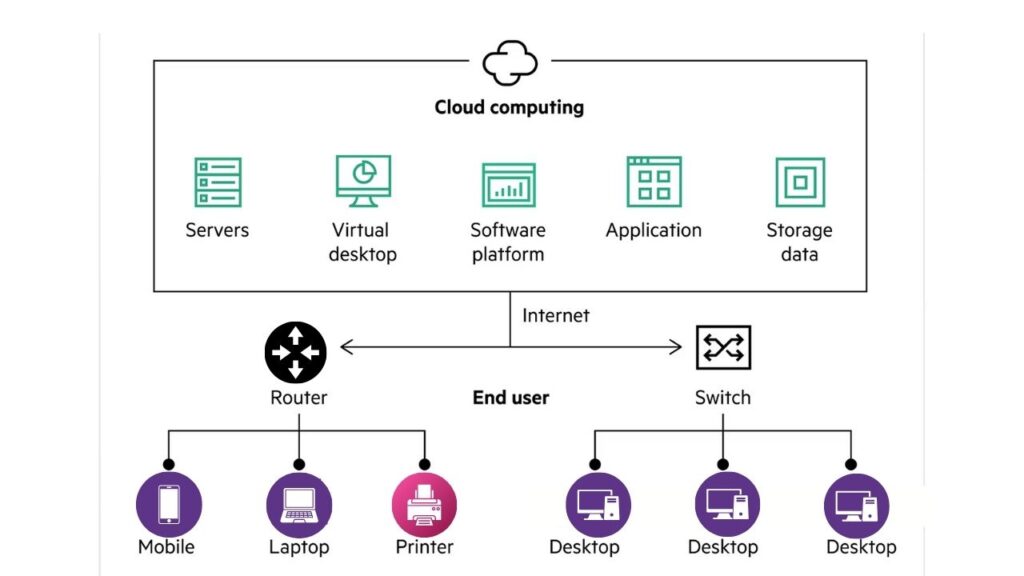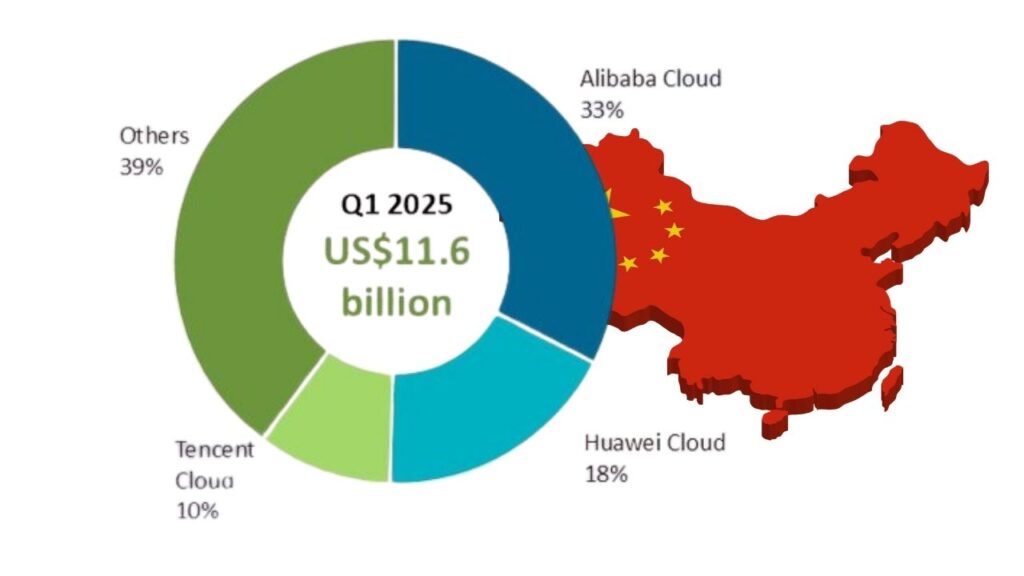China’s cloud computing market has reached a major milestone, hitting $11.6 billion in revenue for the first quarter of 2025. This surge, representing a robust 16% year-on-year increase, highlights the country’s growing reliance on digital infrastructure and advanced technologies such as artificial intelligence (AI). As cloud computing cements its place at the heart of China’s digital transformation, understanding this market’s trends, drivers, and future opportunities is crucial for professionals, businesses, and technology enthusiasts alike.

Cloud computing is not just a buzzword in China—it’s a transformative force changing how companies operate, innovate, and compete. From powering AI-driven logistics to supporting the digitalization of traditional industries, the cloud is now a key pillar of China’s economic strategy. In this article, we’ll explore what’s fueling this growth, who the main players are, how businesses are leveraging the cloud, and what the future holds for China’s rapidly evolving digital landscape.
Table of Contents
China’s Cloud Computing Market Hits $11.6 Billion in Q1 2025
| Feature | Details |
|---|---|
| Q1 2025 Market Size | $11.6 billion |
| Year-on-Year Growth | 16% |
| Leading Providers | Alibaba Cloud (33%), Huawei Cloud (18%), Tencent Cloud (10%) |
| Main Growth Driver | AI-related demand and enterprise digitalization |
| Projected 2025 Annual Spend | $46 billion |
| Notable Investment | Alibaba: $52.7 billion in global cloud expansion |
| Market Shift | From basic infrastructure to AI and value-added services |
| Unique Market Focus | Infrastructure-as-a-Service (IaaS), not just SaaS |
| Official Reference | Canalys Mainland China Cloud Services Market Q1 2025 |
China’s cloud computing market is experiencing unprecedented growth, reaching $11.6 billion in Q1 2025 and setting the stage for further expansion. Driven by AI innovation, enterprise digitalization, and strategic investments, the cloud is transforming how Chinese businesses operate and compete on the global stage. As the market matures, success will depend on embracing new technologies, building strong partnerships, and navigating regulatory complexities. Whether you’re a business leader, IT professional, or investor, understanding China’s cloud landscape is essential for thriving in the digital age
Understanding Cloud Computing: The Basics
Cloud computing refers to delivering computing services—like storage, processing power, and software—over the internet, rather than relying on local servers or personal computers. This model allows businesses to access powerful resources on demand, pay only for what they use, and scale up or down as needed.

Why Is Cloud Computing Important?
- Cost Efficiency: Companies avoid the high upfront costs of buying and maintaining physical servers.
- Flexibility and Scalability: Businesses can quickly adjust resources to meet changing demands.
- Access to Advanced Technologies: Cloud platforms provide tools for AI, big data analytics, and machine learning that would be difficult or expensive to develop in-house.
- Business Continuity: Data stored in the cloud is protected from local disasters and can be accessed from anywhere.
In China, these benefits are amplified by the country’s massive digital economy and its commitment to becoming a global leader in technology.
Why Is China’s Cloud Market Growing So Rapidly?
1. The AI Revolution
Artificial intelligence is a major driver of cloud adoption in China. AI applications—from smart manufacturing to intelligent customer service—require enormous computing power and vast amounts of data storage. Cloud platforms offer the ideal environment for developing, training, and deploying AI models at scale.
Real-World Example:
A leading e-commerce platform in China uses cloud-based AI to analyze millions of transactions in real time, optimizing product recommendations and managing inventory more efficiently.
2. Enterprise Digital Transformation
Chinese enterprises, both large and small, are moving away from traditional IT infrastructure. The shift to cloud-based solutions allows them to modernize operations, improve efficiency, and stay competitive in a rapidly changing market. The COVID-19 pandemic accelerated this trend, as remote work and online services became essential for business continuity.
3. Strong Government Support
The Chinese government has made cloud computing a strategic priority, investing in “new infrastructure” projects that include cloud data centers and AI research. Policies encourage digital transformation across industries, creating a favorable environment for cloud adoption.
4. Unique Market Dynamics
Unlike many Western markets, where software-as-a-service (SaaS) dominates, China’s cloud market has a strong focus on infrastructure-as-a-service (IaaS). This reflects the country’s need for scalable, high-performance computing to support AI, big data, and other advanced applications.
Who Are the Key Players in China’s Cloud Market?

Alibaba Cloud
- Market Share: 33%
- Strengths: Leading in AI workloads, global expansion, and a robust partner ecosystem
- Notable Investment: Committed $52.7 billion to expand its global cloud infrastructure, including new data centers in Asia and the Americas
- Innovation: Pioneering AI-native cloud services, making it easier for businesses to deploy and scale AI applications
Huawei Cloud
- Market Share: 18%
- Strengths: Strong focus on enterprise AI, partnerships with local governments and industries, and resilience in the face of technology restrictions
- Growth: Outpaced the overall market, driven by demand for secure, high-performance cloud solutions
Tencent Cloud
- Market Share: 10%
- Strengths: Deep integration with Tencent’s consumer platforms, such as WeChat and QQ, and strong capabilities in gaming and media
- Challenges: Growth has been limited by global supply chain constraints, particularly in acquiring advanced GPUs for AI workloads
These three companies dominate the market, but competition is intensifying as other tech giants and specialized providers invest in cloud and AI infrastructure.
How Are Chinese Businesses Using the Cloud?
AI-Driven Innovation
Businesses across sectors are leveraging cloud-based AI to:
- Automate customer service with intelligent chatbots
- Optimize supply chains using predictive analytics
- Enhance product design with machine learning models
Hybrid and Multi-Cloud Strategies
Many organizations combine public and private cloud resources to balance flexibility, security, and compliance. This approach is especially important in China, where data localization laws require certain information to remain within national borders.
Building Partner Ecosystems
Cloud providers are creating extensive partner networks—including software developers, consulting firms, and AI startups—to deliver customized solutions and value-added services. This ecosystem approach is driving innovation and expanding the reach of cloud technology.
Challenges Facing China’s Cloud Market
1. Technology and Supply Chain Restrictions
China faces ongoing challenges in accessing advanced semiconductors and other critical technologies due to international trade restrictions. Cloud providers are responding by developing domestic alternatives and investing in local supply chains.
2. Overcapacity and Market Maturity
Rapid investment in new data centers and AI infrastructure raises concerns about potential overcapacity. As the market matures, providers must focus on efficiency, service quality, and differentiation to maintain growth.
3. Regulatory and Security Concerns
Strict data localization and cybersecurity regulations require companies to carefully manage where and how data is stored and processed. Compliance is essential for businesses operating in sensitive sectors.
Practical Guide: Succeeding in China’s Cloud Era
For Businesses
- Embrace AI and Automation: Choose cloud providers with strong AI capabilities and ready-to-use tools for your industry.
- Adopt Hybrid Solutions: Balance public and private cloud resources to optimize performance, cost, and compliance.
- Leverage Partner Networks: Work with providers offering robust partner ecosystems for tailored solutions.
For IT Professionals
- Stay Informed: Keep up with the latest trends in AI, cloud architecture, and data security.
- Build In-Demand Skills: Expertise in cloud migration, AI integration, and big data analytics is highly valued in the job market.
- Understand Compliance: Familiarize yourself with China’s data protection and cybersecurity laws.
For Investors
- Monitor Market Leaders: Alibaba, Huawei, and Tencent remain dominant, but emerging players and niche providers may offer unique opportunities.
- Assess Policy Trends: Government initiatives and regulatory changes will continue to shape the industry’s trajectory.
The Future of Cloud Computing in China
Looking ahead, China’s cloud computing market is expected to reach $46 billion in annual spending by the end of 2025. The focus will continue to shift from basic infrastructure to advanced AI and data-driven services. As more industries undergo digital transformation, demand for secure, scalable, and innovative cloud solutions will only grow.
Emerging trends to watch include:
- Expansion of AI-Native Cloud Services: Providers will offer more pre-built AI tools, making it easier for businesses of all sizes to leverage advanced analytics and automation.
- Internationalization: Chinese cloud companies are investing in overseas markets, aiming to compete with global giants and support multinational businesses.
- Sustainable Cloud Infrastructure: As energy consumption rises, providers are exploring green data centers and renewable energy sources to reduce their environmental impact.
China’s Ambitious AI Expansion Targets 115,000 Nvidia Chips for Desert-Based Data Centers
China’s AI Chip War Strategy May Already Be Outpacing the West’s Response
FAQs About China’s Cloud Computing Market Hits $11.6 Billion in Q1 2025
What is driving the growth of China’s cloud computing market in 2025?
The main drivers are rapid adoption of artificial intelligence, enterprise digital transformation, and strong government support for digital infrastructure.
Who are the top cloud providers in China?
Alibaba Cloud, Huawei Cloud, and Tencent Cloud are the market leaders, together holding over 60% of the market share.
How does China’s cloud market differ from Western markets?
China places a stronger emphasis on infrastructure-as-a-service (IaaS) and AI computing, while Western markets often focus more on software-as-a-service (SaaS).
What are the main challenges facing the market?
Key challenges include technology access restrictions, potential overcapacity in data centers, and strict regulatory requirements for data security and localization.



















